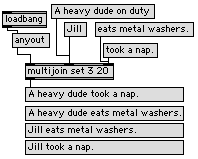multijoin
Created by Panaiotis
© 2001 by Panaiotis. All rights reserved.
General
Joins messages, ints, floats, lists, and symbols into a list. Input to inlets
can be of variable or fixed length, which is determined by the arguments. Output
is determined by the configuration of multijoin.
Input
| |
bang |
in any inlet: sends the current internal list out the leftmost outlet. |
| |
int |
in any inlet: interpreted as a single item list |
| |
list |
in any inlet: gets processed according to the arguments for that inlet |
| |
float |
in any inlet: interpreted as a single item list. |
| |
Symbols |
|
| |
anyout |
Input to any inlet initiates output. |
| |
bangout |
Only a bang will initiate output. |
| |
normal |
Output is characteristic of other standard Max objects. Input to leftmost
inlet sets that inlet and initiates output. Input to other inlets sets value
for that inlet. |
| |
clear |
Response depends on argument for a particular inlet.
If the inlet was given a negative value that forces the length of its
list, clear sets each list member to zero.
Otherwise, clear creates a zero element list for that inlet.
|
Arguments
Arguments determine how many inlets are created up to 32. No arguments will
create two inlets with a variable list length of 255 atoms each. Each inlet
| |
ints |
Positive integers determine the maximum length of a string (atoms) for
the corresponding inlet. The highest maximum is 255. Input lists longer
than the set maximum will be truncated to the value of the argument. Input
lists shorter than the value will be sent through as is.
Negative integers fix the length of the string. The list members are
initiated to '0's. Longer input lists will be truncated, shorter ones
will replace the current content of that inlet and leave the remaining
list members as is.
A zero arg value is the same as 255, which sets the maximum input list
length for the corresponding inlet to 255.
|
| |
symbols |
A symbol as an argument sets the value of that inlet to the symbol and
the maximum length of the inlet list/string to one. |
Output
Multijoin takes the lists that
have been sent through its inlets and concatenates them. The lists may be comprised
of ints, floats, or symbols. The resulting string is sent out its outlet.
Examples
 |
loadbang tells multijoin
to send its data through the outlet any time it receives something from
any inlet.
The set argument prepends "set" to the output so that
the remainder will change the message box attached to the outlet.
The second argument "3" assures that the second string has
no more than 3 members. The second inlet will pass:
Jill
A heavy dude
The third argument will pass up to a 20 member string, so both messages
attached to the inlet will be sent in their entirety.
The four possible outcomes are shown in the message boxes below multijoin.
|
